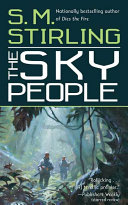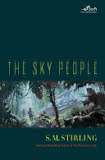jurassic venus:
The Sky People by S M Stirling
Stirling's Venus is hot, moist, forested - as lush and fecund as Pellucidar, and an ideal scene for jungle adventure.
Stid: I notice, your comparison is with Pellucidar rather than with Amtor, even though we're supposed to be talking about a fictional Venus. I suppose this is because many Amtorians were advanced technologically, whereas Stirling's Venusians are nowhere near domination of their environment.
Zendexor: Correct. And neither are his Terran explorers. Very much in the same way that David Innes and his helper Abner Perry are overwhelmed by the task of bringing "civilization" to Pellucidar (and indeed seem largely willing to give up), Stirling's high-tech Terran newcomers - the "Sky People" of the book's title - have only a precarious foothold on Venus; their efforts seem puny as they contend with the planet's vastness and untamed savagery.
A recipe for raw adventure and heroism.

He'd enjoyed wilderness back on Earth... but even if you were out in the bayous beyond Grand Isle, you always knew that you were really in an island of wild in a sea of civilization. Here it was exactly the opposite. There was a world out there, and the base or even Kartahown and the Mother River and its cities were the islands. Tiny little islands, in a sea of living things, all of them mating and killing and eating just as they always had. If you wanted to know what was over the hills, you had to go there yourself.
This author's achievement, it seems to me, is to "ground" this romantic scenario with a startling degree of realistic detail. I don't wish to denigrate other great writers who have achieved tales of colourful adventure; I merely point out the particular route chosen by S M Stirling to reach the desired goal - namely, dazzling detail.
The Terran-Venusian settlement, Kartahown, is a ramshackle, Brackett-style combination of modern interplanetary and traditional native elements, but it is described far more specifically than Brackett would ever have done.
Here is the scene that greets the Terran, Marc Vitrac, as he returns to base on the back of a dinosaur-sized native mount controlled by electronic implants (cheaper than shipping armored vehicles from Earth).
...thehelium-cooled pebble-bed reactor and generator emitting a plume of steam beneath its mound of dirt... the airship mooring tower, built of shamboo and local woods... the semi-experimental fields growing crops from Earth alongside the Venusian plants domesticated by Kartahown. The town proper was made up of low adobe buildings lining the three dirt streets... most had roofs that were curves of green synthetic, each made of half a cargo pod; a few used reddish homemade tile or brown wooden shingles instead...
Hitching posts and watering troughs stood at intervals along the streets, and there were board sidewalks on the main drag, with a proud but lonely stretch of brick in front of the small-town-cum-commandant's office. Riders on churr-back and pedestrians and carts drawn by churr or tharg-oxen made room for the ceratopsian. There were a couple of engine-powered ground vehicles in town, but they were carefully mothballed for emergencies.
Many of the people waved and called greetings, and Marc waved back. This was a small town. Only one hundred thirty-two Earthlings were here, not counting the score of newcomers... Nobody here was old, and everyone was a top physical specimen, but there was a whole planet of unfamiliar perils around them. About twice as many Kartahownians and tribesfolk lived around the base, and there was a floating population of visitors from there and elsewhere, traders and pilgrims and the sheerly curious.
"Sort of an acadaemogorsk combined with frontier Deadwood," an English voice said from among the passengers.
Marc nodded, chuckling. He'd been a little surprised himself when the final training courses had put so much emphasis on things like blacksmithing and carpentry, but it made sense when you remembered how far away Earth was and how much it cost to ship anything this far. Every ounce counted, and every ounce acquired on Venus meant spaceship cargo freed up for something that couldn't possibly be made there, like scientific instruments.
Harlei: Plenty of action in the book, but the description is as exciting as the action, I'd say. I find that noteworthy. I suppose it should apply to any good book, but...
Zendexor: But there's a couple of particular reasons for it here.
Detailed description is Stirling's way of insisting that we believe in his counter-factual Venus, and, so help me, by the time I've read the book I am almost in the frame of mind to believe that this is indeed the real Venus! It's like being hypnotised!
And secondly, of course, this sort of writer is giving us the only chance we get to juxtapose twenty-first century technology with first-half-of-twentieth-century beliefs and hopes about the Solar System. It's a combination we were deprived of until neo-OSS writers came along.
Stid: Sounds good, but there's a certain contrived aspect to it, quite apart from the neo-OSS contrary-to-fact assumption about our sister planet. I'm referring now to the book's premise that this traditional, fecund, wild, outdoorsy, life-in-the-raw Venus was actually engineered - it was made habitable by alien intervention way back in Earth's Jurassic period, and seeded with primitive humans millions of years later. A stage set.

Harlei: No problem in that - for heroes, I mean. They've still got to survive in the "stage set", and the dangers are very real. Besides, what does it matter how the scene originated: blind evolution or deliberate intervention or both - it's all one thing, ultimately: the working of cause and effect, via one agency or another.
Stid: You're philosophical today, Harlei. I thought it would be the physical adventure that wowed you.
Harlei: Both. Philosophical, yeah, but likewise wow for the solid physicality of the tale -
The pterodactyl worked for height, looked down at the animal thrashing in its claws, and dropped him from two hundred feet. The squeal ran all the way down as the falling beast thrashed his legs, then cut off abruptly at the meaty thud of impact. The winged reptile turned in a circling gyre as it descended and then settled to the ground like a flying avalanche, mantling its wings over the dead animal as it fed. After an instant, the long head came up with a dripping chunk in its jaws. It bolted the food whole, and you could see the lump traveling down the throat.
Zendexor: All right, it's a many-sided book, but let's focus on the hero aspect. It gives us an angle on how Stirling can achieve his Burroughs-echoing effects by more reasonable routes. That's to say, the sound reasons he gives for the sticky situations his heroes find themselves in.
Ultimately, it's to do with the cost of transportation. Everything stems from that, you could say.
It means, in the first place, that only a few Terrans get to Venus. Outnumbered, they must struggle against the odds. Secondly, because they are so few and so expensive to transport, they have to be exceptional individuals - heroic material. Thirdly, they are restricted as to gear, though they make the best of what they have.
The result? You get ERB-type situations. Fights with great predator beasts and savage men. Single combats with a jealous warrior who wants the same woman as the hero. Storms which blow a ship off course into unknown territory. And each time the tale lets rip, it makes sense. A battle in alliance with the Cloud Mountain people against Neanderthal invaders - well, that's what you can get on a world like this.
Two hits was good practice at this range and with men who'd only been training for a month. You could become a fair or at least middling rifle shot in a month, but even practicing ten hours a day wouldn't make you more than a novice with a bow; that took thousands of hours. The Cloud Mountain men screamed their joy and shot again and again, as fast as they could draw.
Most of the enemy raised their shields and rushed forward, bellowing, as they would have against a shower of blowgun darts. That did them less good than they'd thought it would. For one thing, they had a wider killing ground to cover than they would have with blowguns.
For another, a string under a hundred pounds of tension could punch a couple of ounces of arrow a lot faster than your lungs could push a dart. Arrows hit hard, and harder still as the enemy got closer. Marc drew and shot, drew and shot, distantly aware that he was glad of the activity distracting him from the fact that scores of gorilla-strong humanoids were rushing at him with intent to kill him and eat his flesh, and not necessarily in that order. The noises they made were louder than any human could have made, coming from those barrel chests, but they covered a smaller and deeper range of sounds. It was rather like being charged by a line of carnivorous foghorns.
Harlei: With this stuff about transplanted Neanderthals, are we in danger of losing sight of the Venus-ness of Venus, in Stirling's book? Because it is very much Venus, you know - very much worthy to take its place among the vivid Venuses we've discussed on our site.
Zendexor: True - let's get geographical. On the storm-tossed airship Vepaja whose crew are looking in vain for a place to tie down.
The ground below was still visible through wisps of hard-driven cloud. It was tall forest, almost jungle, covering a maze of steep-sided hills. Some of the sheltered parts might have been possible... if the ground speed of the wind hadn't already been faster than the maximum the Vepaja's engines could command. Trying to drop anchor would just tear the cable mountings out of the frames. Marc called up the feed from one of the cameras mounted in a blister on the keel, dialing the magnification, and blinked as a tree lashing on a hilltop below suddenly shattered, the massive crown flying along like a tumbleweed rolling through the air, shedding bits of itself as it went.
They'd had storms like this in Jamestown. They were alarming enough with a good, stout three-foot-thick wall between you and the outside. Suddenly the airship stopped feeling like a flying house; the shuddering, toning sensation that welled up through the chair and straps made it seem more like a chip in a spring flood. His hand moved on the trackball, and the camera scanned; just northward was the coast, and waves like flowing walls were crashing on... over... granite cliffs, breaking in vast torrents of white water and withdrawing seaward, carrying boulders and hundred-foot tree-trunks with them like beach-wrack.











































